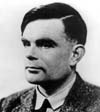CODEBREAKER: Hounded to Death
Campaign to win official apology for Alan TuringYakub Qureshi | ManchesterEveningNews.com
A campaign has been launched to win a posthumous apology for computer pioneer Alan Turing over his conviction for homosexuality.
The brilliant mathematician, who spent his key years at Manchester University, is hailed as one of the founders of modern computing.
But a conviction for homosexuality effectively ended his career. Troubled Turing went on to commit suicide in 1954, aged just 41.
Now a group of admirers of the scientist - named as one of the 100 most important people of the 20th century by Time Magazine - are lobbying the government to make a posthumous apology.
Codebreaker
 The Cambridge graduate was one of Britain's best wartime codebreakers - part of the team at Bletchley Park which unravelled the secret of the Enigma code machines used by German U-boats. Turing was awarded an OBE in 1945 for his wartime services to the Foreign Office and moved to Manchester to help work on the pioneering Mark 1 computer.
The Cambridge graduate was one of Britain's best wartime codebreakers - part of the team at Bletchley Park which unravelled the secret of the Enigma code machines used by German U-boats. Turing was awarded an OBE in 1945 for his wartime services to the Foreign Office and moved to Manchester to help work on the pioneering Mark 1 computer.He was prosecuted for gross indecency for having sex with a man in 1952, but escaped jail after being offered an alternative of taking an experimental hormone treatment to reduce sex drive.
However, the case effectively ended his career and Turing fell into despair. His body was found by a cleaner at his Wilmslow home in 1954 - next to him was a half-eaten apple laced with cyanide. It was not until 1967 that laws against gay men were lifted.
More than 500 people have now signed the petition on the 10 Downing Street website to call for an official apology 'recognize the tragic consequences of prejudice that ended his life and career'.
Hounded
John Graham-Cumming, a leading British computer expert who launched the campaign, said: "I think that Alan Turing hasn't been recognised in Britain for his enormous contribution because he died in his forties and almost certainly because he was gay.
"It is atrocious that we don't recognise this man and the only way to do so is to apologise to him. This man was a national treasure and we hounded him to his death.
"One of the things for people in the computing world is that he was part of the war effort but we don't give him recognition in the same way as other heroes. To me, he was a hero in the second world war."
Since his death, plaques, buildings and statues have been raised in Turing's honour. The computing world's equivalent of the Nobel Prize has been called the Turing Award since 1966.
Article from: ManchesterEveningNews.com
CODE-BREAKER: The life and death of Alan Turing
by Jim Holt | NewYorker.com
On June 8, 1954, Alan Turing, a forty-one-year-old research scientist at Manchester University, was found dead by his housekeeper.
Before getting into bed the night before, he had taken a few bites out of an apple that was, apparently, laced with cyanide.
At an inquest, a few days later, his death was ruled a suicide. Turing was, by necessity rather than by inclination, a man of secrets. One of his secrets had been exposed two years before his death, when he was convicted of “gross indecency” for having a homosexual affair. Another, however, had not yet come to light.
It was Turing who was chiefly responsible for breaking the German Enigma code during the Second World War, an achievement that helped save Britain from defeat in the dark days of 1941.
Had this been publicly known, he would have been acclaimed a national hero. But the existence of the British code-breaking effort remained closely guarded even after the end of the war; the relevant documents weren’t declassified until the nineteen-seventies. And it wasn’t until the eighties that Turing got the credit he deserved for a second, and equally formidable, achievement: creating the blueprint for the modern computer.
It is natural to view Turing as a gay martyr, hounded to death for his sexuality despite his great service to humanity. But it is also tempting to speculate about whether he really was a suicide.
The flight to Moscow, in 1951, of Guy Burgess and Donald Maclean, British diplomats and rumored lovers who had been covertly working for the Soviets, prompted one London newspaper to editorialize that Britain should adopt the American policy of “weeding out both sexual and political perverts.” Turing’s role in wartime code-breaking had left him with an intimate knowledge of British intelligence.
After his conviction for homosexuality, he may have seemed out of control. He began travelling abroad in search of sex, visiting countries bordering on the Eastern bloc. The coroner at his inquest knew none of this. No one tested the apple found by his bedside for cyanide.
The possibility of clandestine assassination is hinted by the title of David Leavitt’s short biography, “The Man Who Knew Too Much: Alan Turing and the Invention of the Computer” (Norton/Atlas; $22.95), borrowed from the Hitchcock thriller.
Leavitt, the author of several novels and short-story collections with gay protagonists, rings the gay-martyr theme in the book’s opening pages by invoking another film classic, “The Man in the White Suit.” In that 1951 comedy, which Leavitt reads as a gay allegory, a scientist is chased by a mob that feels threatened by a miraculous invention of his. Then a third film is mentioned, one that evidently made an impression on Turing: the 1937 Disney animation “Snow White and the Seven Dwarfs.” Those who knew him said that he was particularly fond of chanting the witch’s couplet, “Dip the apple in the brew, / Let the sleeping death seep through.” So we’re prepared for a life story that, though steeped in logic and mathematics, is part mystery, part parable of sexual politics, part fairy tale...
Read the full article at: NewYorker.com
Mystery of Alan Turing - The Man Behind the Modern Computer
"This is a short version of Alan Turings life, achievements, success and death. Pay attention to the symbolism of the androgyny, the "all male" creation of the machine, the computer as mans child and dont forget his religiously symbolic death.
Turing is often considered to be the father of modern computer science. He provided an influential formalization of the concept of the algorithm and computation with the Turing machine. With the Turing test, meanwhile, he made a significant and characteristically provocative contribution to the debate regarding artificial intelligence: whether it will ever be possible to say that a machine is conscious and can think."






















